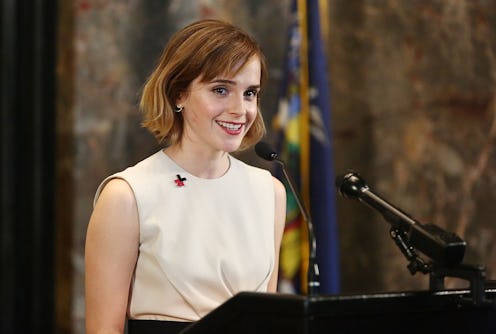Emma Watson wants you (yes, you!) to speak out about the issues women face everyday — specifically, starting conversations on the topic with men, whether they want to listen or not. In the April issue of Esquire UK, dubbed the Women & Men Issue, Watson is focused on talking about feminism with both sexes, to see how men and women can work together to finally achieve equality. This conversation that Watson wants to have hasn't been an easy one to get started. As the magazine points out, women have been wanting to get this ball rolling for awhile, but "men have been ignoring them, or talking over them, or offering well-meant but ultimately unhelpful 'logical' solutions before shoving off to the pub." Watson is tired of those excuses though, and plans to keep talking until we're all listening.
Watson needs women and men to take ownership of the feminist fight because it is one that is bigger than her. She may be a celebrity who will get the cameras and magazines to care for a little while, but her fight for equality isn't self-serving. In fact, Watson's decision to speak out, to call herself a feminist, has been met with backlash, with many calling her names for speaking about equal pay and equal rights. "But," Watson told Esquire, "there’s a willingness now to be like, ‘Fine. Call me a ‘diva,’ call me a ‘feminazi,’ call me ‘difficult,’ call me a ‘First World feminist,’ call me whatever you want, it’s not going to stop me from trying to do the right thing and make sure that the right thing happens.’ Because it doesn’t just affect me, it affects all the other women who are in this with me, and it affects all the other men who are in this with me, too.”
If anything, this anti-feminist hate has only made her more passionate about promoting gender equality through the United Nation's HeForShe movement, which she helped launch to encourage both men and women to focus on the issue. She's already announced she's taking a break from acting to dedicate herself wholly to the movement for a full year, telling Paper Magazine recently she wanted to take the time to educate herself through reading. "I almost thought about going and doing a year of gender studies, then I realized that I was learning so much by being on the ground and just speaking with people and doing my reading," she told the magazine. "I'm reading a lot this year, and I want to do a lot of listening."
That's the message Watson wants you to take away any time she discusses feminism, whether it's at the U.N. or for the cover of Esquire. Watson wants this topic to be within reach for anyone, because, as she told the U.N. two years ago, "we need everyone involved." And who better to get them involved than Hermione Granger herself? Watson is a touchstone for many young women and men who grew up watching the actress also grow up. But, for many of her fans, specifically male ones, her speech at the U.N. may have been the first time they felt included in this movement. That they could really make a difference. That their words matter. That this fight isn't for anyone in particular, but for everyone.
As Watson told Paper feminism "can and should be academic, and that kind of thinking is so important, but you talk about how it has to be a mass movement to make a big difference. I don't want to preach to the choir. I want to try to talk to people who might not encounter feminism and talk to them about feminism. It's a really interesting job, and it's a really interesting line to tread. I want to engage in the topic with people who wouldn't normally."
This could have included Watson, an actress who could call herself a feminist in an interview without taking that extra step. But she chose to keep going, to keep learning, to keep talking. Watson may have Gloria Steinem on speed-dial, but that doesn't mean she's more connected to the fight for equality than you are. If anything, she doesn't want her personal experiences to be the focus. She talked to Esquire about how pervasive sexual harassment is in the lives of women saying, "I’ve had my arse slapped as I’ve left a room. I’ve felt scared walking home. I’ve had people following me... I don’t talk about these experiences much, because coming from me they’ll sound like a huge deal and I don’t want this to be about me, but most women I know have experienced it and worse… this is unfortunately how it is."
But it doesn't have to be. And the best way to promote awareness and change is, as Watson said, to get everyone out there listening and engaging with her, so they can then, in turn, go off and preach to others who may still feel a disconnect with the movement. By using her voice and rising above criticism, Watson is using her platform to get everyone invested in this fight for equality. She can't do it alone, and she doesn't want to.
Image: Giphy
